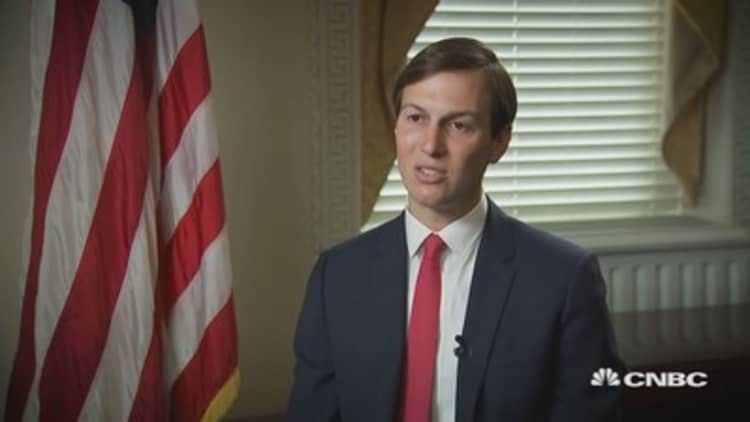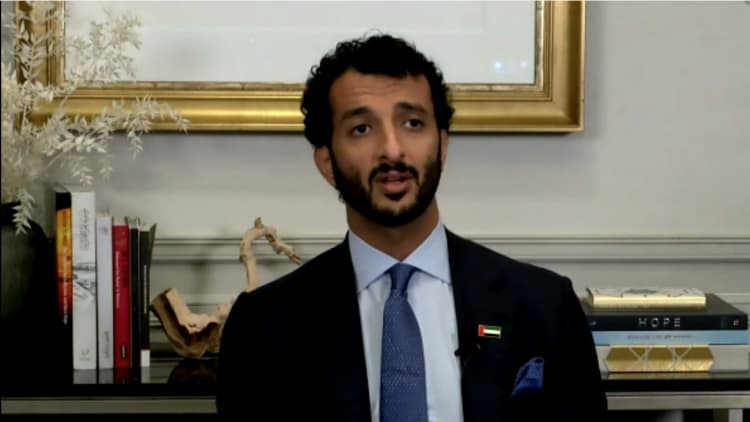
DUBAI, United Arab Emirates — Officials in Israel have high hopes for budding ties with the United Arab Emirates as the country's cabinet on Monday ratified the historic deal establishing diplomatic relations between the two countries for the first time.
Jerusalem Deputy Mayor Fleur Hassan-Nahoum is one of them. Co-founder of the UAE-Israel Business Council, she spoke to CNBC's Capital Connection about the business opportunities made possible by the deal, known as the Abraham Accord.
"People are just so excited for this peace ... the reception we've received here is unprecedented," Hassan-Nahoum said. "The Israeli side is really curious about the UAE, the Emiratis, and vice versa."
Since the accord's announcement, the countries have signed a series of deals on collaboration in areas including technology, healthcare and research.
"On the Israeli side, Dubai, the UAE can be a gateway to the East … the UAE is very interested in Israel's innovative spirit, the start-up nation, innovative technologies from here that can help them, help their exports," she said, naming farming and food tech among the sectors where she saw potential.
Will Saudi Arabia follow suit?
The Palestinian government in the West Bank does not share that optimism. Left out of the deal's construction, the Palestinian Authority called it "despicable" and "a betrayal." Regional analysts say that while the deal temporarily halted Israeli annexations of Palestinian territories, it sent the message that Israel can make major progress in its relations with Arab countries without having to give up any land it's secured in the occupied territories.
This continued tension is what poses an obstacle to other Arab countries following the UAE's lead, but that might not be for long: within weeks of the Abraham Accord's announcement in August, Bahrain joined as well.

Asked whether she foresaw a region-wide shift, Hassan-Nahoum said: "I really believe there is a momentum and I hope the momentum continues. It started with the UAE, followed by Bahrain, there were rumors about Oman, Sudan, and Saudi Arabia, which I think is the big white whale in this story."
A white whale is a metaphor used to describe something that is highly coveted or pursued, but hard to achieve.
Saudi Arabia's reaction to the UAE-Israel news was initially muted, with the kingdom's foreign minister later stating that it would not establish its own diplomatic ties with Israel until the country signed an internationally-recognized peace agreement with the Palestinians. Still, intelligence cooperation between Israel and the kingdom has been an open secret for some time as they share a common adversary in Iran.
"I really do believe that when people see what normalization looks like, when they see that there can be mutual prosperity … it will help bring peace generally across the Gulf, not just with specific countries," Hassan-Nahoum said.
While Saudi Arabia's King Salman is unlikely to recognize Israel, regional watchers believe that his son, Crown Prince Mohammed bin Salman, may be less reluctant — especially considering his friendship with Trump's son-in-law and senior advisor Jared Kushner, who led the Abraham Accord, and his desire to fortify a united front against Iran.
Jared Kushner and U.S. election anticipation
The conversation came as the UAE and Israel launched talks on diplomatic, economic and business relations. The agreement, brokered by President Donald Trump's administration, made the UAE the first Gulf country to establish ties with Israel and was the first such accord for the region in more than 20 years.
It also comes just weeks before the U.S. presidential election. Asked if the election result could derail the momentum for diplomatic reconciliation, Hassan-Nahoum was optimistic, but admitted that Kushner's role in spearheading the accord was vital to that momentum.
"Joe Biden came out and he was very supportive of the deal," the deputy mayor said. "My only concern is that — everybody knows — Jared Kushner was really the architect of this. He took this and put 100% of his attention and efforts into this. I'm concerned that if there is no Jared involved here then the momentum might slow down."
"But let's see what happens," she added. "Certainly from Israel we'll keep our arms open and hope that this continues."



